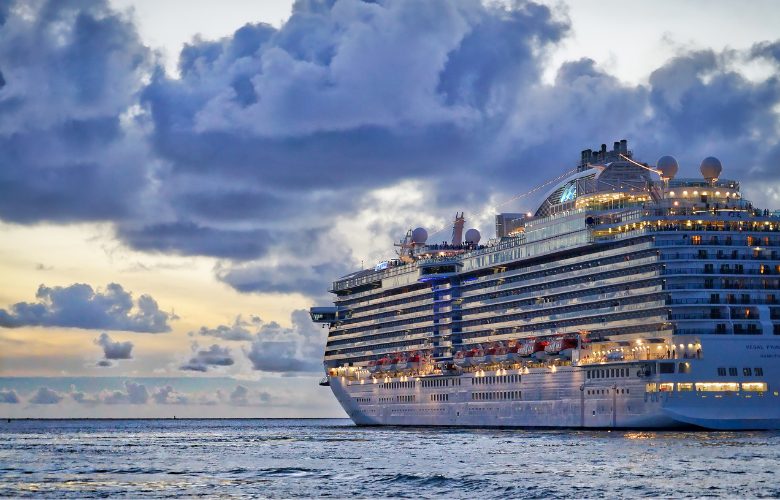
Even at the height of the pandemic over the last two years, larger cruise ships continued to be built by the huge cruise corporations. The pressure on all sides was enormous to keep this industry afloat. Yet, my question is, how sustainable is all this in the long run? And do we really need ever larger cruise ships?
The cruise industry as well as much of the entertainment industry has had it tough over the last few years. They were shut down for many months. Then, afterwards, the CDC kept cautioning travelers to refrain from boarding cruise ships.
Major cause of concern with the largest behemoths amongst the cruise industry is, of course, that up to 9’000 guests and crew can be squeezed onto those ships. Everyone is living and working side by side without a means to really practice social distancing.
From own experience working on cruise ships, I also dare say that no amount of disinfecting the ship will keep the COVID19 virus and its mutations at bay.
We disinfected so much during the last weeks leading up to the shutdown in March 2020, that I actually started to get worried about the health of my staff as they were exposed to all these chemicals on a daily basis.
The disinfectants we were told to use to wipe down all surfaces in our theatre were massively aggressive substances.
Yet, at the end of our last cruise it turned out that several passengers had carried COVID19 onboard. And even with the insane amounts of disinfecting each day, during that last cruise and the following lockdown and isolation on the high seas with only around 2’000 staff onboard, hundreds of staff members got infected and several died.
We are not even looking into the massive air pollution caused by each cruise ship here in this article. One of the Oasis class ships produces as much CO2 exhaust per day as 1 million cars.
Major cruise ship harbors like Southampton have scientifically recorded rising numbers of lung cancer in their population over the years. Do we really want and need that in the long term?
I read an article in The Ecopreneurs. There, Rachel King asks important questions – and offers interesting solutions – in her article “The future of cruises is smaller and more purpose-driven.”
Might smaller cruise ships be more sustainable and safer overall in the future? Might they be a way to bring passengers back on the ships? And might they be a way to avoid damage to the health and environment as well?
Rachel King is thinking of smaller smaller cruises with fewer passengers. Sailing more sustainable ships that are respectful of their destinations and environments. And maintaining a level of luxury so that the passengers don’t miss the mainland during their cruise.
“Over the past couple of years, we’re seeing luxury interest continuing to grow because many travellers are looking for a more intimate experience and more diverse itinerary options — something that we started to see more of following the start of the pandemic,” says Colleen McDaniel, editor-in-chief of Cruise Critic, a Tripadvisor company.
Expedition cruises, McDaniel says, used to be known for their incredible destination and excursion offerings, and less for the ships on which they sailed. Most were bare bones and seen simply as a vessel to a destination.
Now, because cruises are often one of the best ways to visit bucket list destinations like Antarctica and the Galápagos Islands, established liners are adding more luxury amenities to those more adventurous tours.
“So, you get the best of both worlds: a once-in-a-lifetime adventure paired with a five-star onboard experience. And most new ships also have a focus on the latest sustainability technologies and efforts, which is top of mind both for the cruise lines and their guests,” McDaniel says.
Starting in the beginning of this year, Hurtigruten Expeditions launched a new program around the Galápagos Islands. The first in the company’s history.
The launch couldn’t be timed better as tourism interest picks up again in the archipelago as the marine reserve around the Galápagos was just expanded to help protect endangered endemic and migratory species, swelling from approximately 53,000 square miles to 76,000 square miles.
Daniel Skjeldam, CEO of Hurtigruten Group, says, “A major part of our focus on the Galápagos Islands will always be the science, knowledge, and experience. And we have an unrivaled team of expedition leaders and naturalists that can share their knowledge with our guests and give them a more immersive experience,”
“We offer a wide range of activities to match guests’ many different levels of fitness—ranging from paddle boards to kayaks to glass bottom boats. On top of our standard excursions, which include walks, zodiac rides, snorkelling, and hikes.”
Founded in 1893, Norway-based Hurtigruten Group, the parent company of Hurtigruten Expeditions, is putting sustainability at the forefront of what influences how itineraries are planned and how its cruise ships are constructed and upgraded.
With its fleet of custom-built expedition cruise ships (much smaller than what you’d find sailing the Caribbean or Mediterranean), Hurtigruten Expeditions takes passengers to more than 250 destinations in over 30 countries worldwide.
“Travelers these days have a greater sense of awareness about the complex climate problems our planet is facing, so the pandemic has accelerated the trend of the conscious traveller. Many more travellers are choosing their travel company or cruise liners based on their attitude and commitments towards sustainability,” Skjeldam says.
According to an October 2021 survey of TripIt customers, more than half of individuals wanting to book a ticket on a cruise liner, consider political, environmental, and social issues when they travel.
And 11% of respondents said they have a cruise planned in the year ahead. Tripit found millennials are especially more environmentally conscious when it comes to travel.
Being twice as likely (16%) to consider the impact of their travel-related carbon emissions than Gen Xers (7%) or baby boomers and older (8%).
“Many people are rethinking how they travel,” says Jen Moyse, senior director of product at TripIt from Concur.
Top issues when booking travel also include the ethics of traveling to a destination, (i.e., over-tourism) and the impact to the local community.
“These values could impact how people travel moving forward as they consider their options. Travelers may choose cruises that have a lower carbon footprint or brands that have programs to revitalize or maintain the ecosystems in which they operate.”
Personally, I hope very much that this will be the case. Rather than building ever-larger, floating entertainment parks for the high seas, where financial gain will ultimately always win over considerations towards ecological sustainability, health, and humanity.
Original article by Rachel King in The Ecopreneurs,
“The future of cruises is smaller and more purpose-driven”
The Covid Odyssey of a Stage Manager – Part 1
The Covid Odyssey of a Stage Manager – Part 2


Liam Klenk was born in Central Europe and has since lived on four continents. Liam has always been engaged in creative pursuits, ranging from photography and graphic design, to writing short stories and poetry, to working in theatre and shows. In 2016, Liam published his first book and memoir, 'Paralian'.
Read Full Profile© 2021 TheatreArtLife. All rights reserved.

Thank you so much for reading, but you have now reached your free article limit for this month.
Our contributors are currently writing more articles for you to enjoy.
To keep reading, all you have to do is become a subscriber and then you can read unlimited articles anytime.
Your investment will help us continue to ignite connections across the globe in live entertainment and build this community for industry professionals.